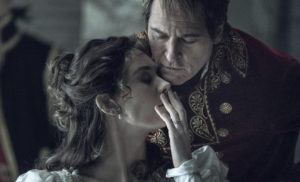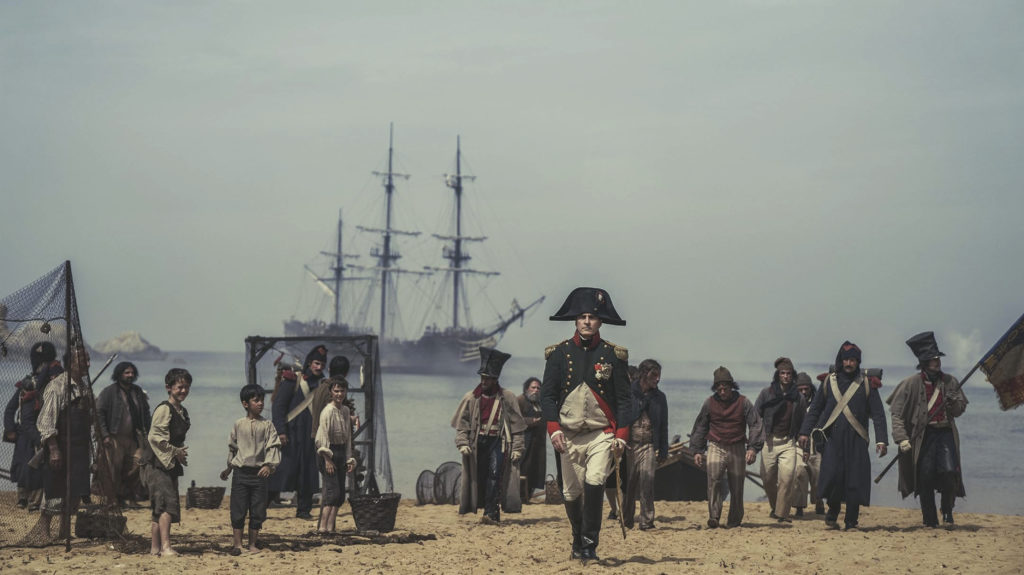Rising above the 7th Arrondissement of Paris is the gold dome of Les Invalides, a landmark that serves as both a French military museum and the final resting place of the nation’s greatest general, Napoleon Bonaparte.
The engravings surrounding his sarcophagus depict him as one of the ancients, adorned with laurels and togas next to tablets listing his vast accomplishments.
Napoleon’s legacy as both a military mastermind and a statesman is hard to summarize — and complicated to assess. Similarly, there’s just too much to the man to capture in a single film.
Still, the tagline of celebrated director Ridley Scott’s new “Napoleon” — released in theaters Nov. 22 — promises an ambitious attempt: “He came from nothing. He conquered everything.”
For better or worse, those words are where the film’s respect for Napoleon ends.
There is nothing of Napoleon’s rise from obscurity in Corsica to the top of the French Republic, nor mention of his early military victories. The years that he spent building the charisma and political capital to seize power as First Consul and eventually as the self-crowned emperor go unnoticed. Viewing “Napoleon” in a vacuum, one might wonder: How did France become an empire? And who even is this guy?
Instead, the Napoleon introduced to viewers (played by Joaquin Phoenix) is reduced to a simp for his first wife Josephine (Vanessa Kirby) and, frankly, a bore.

The historical Napoleon is remembered for his energy, inquisitiveness, charm, and ability to micromanage the French Empire. But Scott’s Napoleon spends much of his screen time sitting forlornly on couches or behaving depravedly with Josephine, rather than leading his men in the throes of battle or engaging in geopolitical power plays with Russia, Austria, the Vatican, and his notorious adversary, Britain.
The director seems more inclined to show Phoenix’s Napoleon sleeping (for comedic effect) than doing anything interesting with his troops (apart from him passing out bread to several soldiers during the doomed Moscow campaign).
Scott’s strange inversions don’t stop there. While Napoleon has long been portrayed as a little man in stature (although in reality, he was average height for his day) but a big one in thought, will, and power, the on-screen version is the opposite.
After being told of Josephine’s affair while in Egypt, Napoleon returns to France to ragefully confront his wife. As a command, he warns that she is nothing without him. But it is a threat with no foundation, for this position of power is quickly reversed in the next scene with Josephine repeating the same words.
Josephine, we are made to understand, was truly the master of the relationship, while Napoleon was nothing more than a whimpering cuckold. It’s a notion that seems to drive the whole film: Napoleon was not really in command (this is even demonstrated when his cold, demanding mother convinces her sheepish son to have relations with a young woman to breed an heir for the empire).
By elevating Josephine as his prime motivation in several major events (including inaccurately suggesting she was the reason he left Elba during his first exile), Scott’s Napoleon is merely an angsty, boyish man.
His military maxims — ones that are still studied today — are also spurned. Beyond his strategizing for Waterloo, his greatest and last defeat that led to his second exile, Napoleon’s tact briefly shines forth during the Battle of Austerlitz, arguably his greatest victory; while cinematic, even Scott’s Austerlitz sequence rings hollow because it disregards the historical truth (and the French Army’s battleplan) for the myth — that thousands died as Napoleon’s artillery fired at the ice underneath the retreating Austrian and Russian troops.
In truth, only a dozen bodies have been found. But the myth masks the traps Napoleon laid; even in his greatest victory, the general cannot “win the day” in Scott’s “Napoleon.” Napoleon’s war victories — the most of any leader in history — are all enshrined on the tablets in Les Invalides but omitted in the film.
Scott seems uninterested in compensating for such omissions with other aspects of history. For example: The French Revolution and the Enlightenment, two other historical realities that are crucial to understanding what “made” Napoleon, appear nowhere in the movie.
Ultimately, his love and friendship with Josephine are not enough to present “Napoleon’s” portrait of its main subject as flesh and blood.
Les Invalides’ monuments are not flesh and blood either, but they convey a sense of the man’s standing in history. But “Napoleon” leaves us wondering why this man is even worth remembering at all. The film does not wrestle with his legacy, criticize his mythic stature, or explore what made him tick beyond sexual desires and dynastic aspirations. There is only one moment on St. Helena when the famed general — who, at this point, has lost everything he loved, including Josephine — purports a false narrative of himself that is easily debunked by two young girls.
The scene, however, is not enough to counter Napoleon’s self-aggrandizement and mitigating responsibility for blunders in his memoirs (which the film also fails to portray). “Napoleon” shortchanges its protagonist in too many respects to the point where the film’s tagline is meaningless, baseless like the character’s command to his wife. By the end, the viewer does not know where he came from, what he conquered, and how he should be regarded today.
The lifeless and hollow Napoleon of Scott’s film would be unworthy of a shrine in Paris that more than 1 million tourists visit per year — or, perhaps, even a movie more than 200 years after his death.

